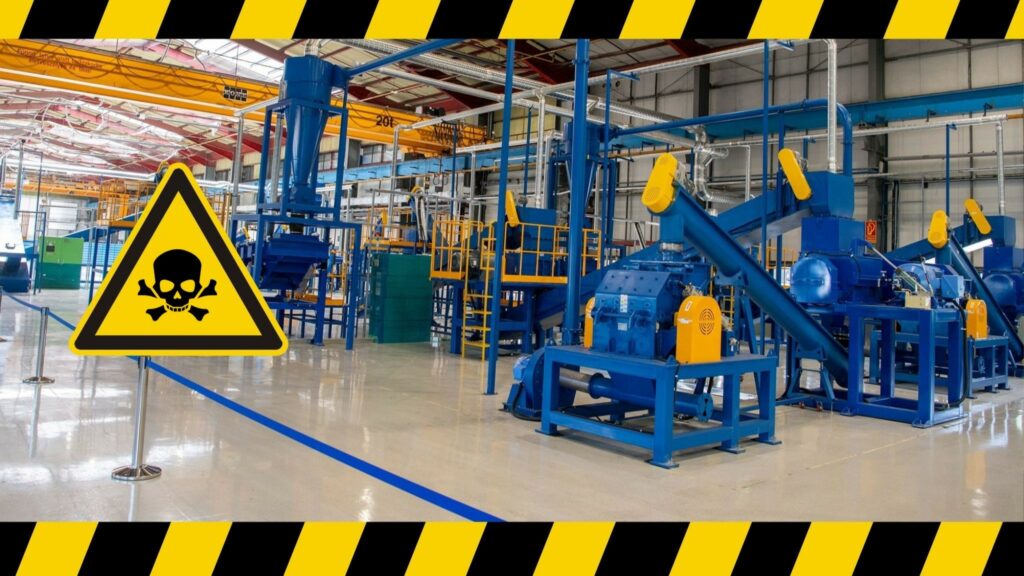The https://english.atlatszo.hu use cookies to track and profile customers such as action tags and pixel tracking on our website to assist our marketing. On our website we use technical, analytical, marketing and preference cookies. These are necessary for our site to work properly and to give us inforamation about how our site is used. See Cookies Policy
Inspectors of the Bátonyterenye battery processing plant suffer sore mouths and skin rashes
Dangerous conditions in the South Korean-owned SungEel Hitech Hungary Kft’s EV battery recycling plants continue to endanger workers and surrounding residents. As a consequence, the two plants located in Szigetszentmiklós and Bátonyterenye have received four warnings and eight fines in the last year alone.
The Nógrád County Government slapped the Bátonyterenye lithium-ion battery recycling plant with a HUF 31.2 million fine for numerous safety violations.

The Bátonyterenye plant primarily processes faulty batteries discarded by the Göd-based Samsung SDI factory and the Komárom-based SK Battery factory. The northern Hungarian plant – SungEel Hitech Hungary Kft’s second plant in the country after they already opened one in Szigetszentmiklós – processes around 28 thousand tonnes of waste batteries annually. The HUF 9.3 billion investment in Bátonyterenye, inaugurated in July 2021, was supported by a HUF 2.8 billion grant from the Hungarian government.
🇭🇺 Újraindítjuk a gazdaságot!
🚗 Magyarországnak meghatározó szerepe van az elektromos autóiparban.
👉 Bátonyterenyén 100 új munkahelyet hoz létre az akkumulátorokat újrahasznosító dél-koreai SungEel HiTech Kft.Posted by Menczer Tamás on Wednesday, 7 July 2021
The latest inspection found that conditions in the factory – already concerning upon previous visits – have deteriorated. The factory floor reeked of solvents, and the inspectors themselves suffered from skin and mucus membrane irritation and showed symptoms like rashes, redness, scratchy throats, and mouth sores. According to the official report, the stench of solvent spread beyond the plant’s vicinity and reached residential buildings across the road.
The inspection also found that the plant was storing over a thousand barrels of waste on the premises without a permit. The company was fined for illegal waste management activities and a failure to keep records.
But the report does not identify the cause of the strong solvent smell, nor did it link it to the illegally stored waste. The fine was aggravated by the company’s history of similar offences – they have previously been fined millions of euros for the same infringements. In total, they were the subject of 12 sanctions – four warnings and eight fines.
And yet, if it sounds like authorities are cracking down on the company, the bigger picture shows that the fines barely leave a dent in the company’s finances – just last year, they enjoyed a €18.5 billion turnover and a profit of €1.6 billion. Suddenly, the €31.2 million fine seems less like a formidable punishment dished out by an iron-fisted authority and more like the Nógrád County authority’s half-hearted attempt at gentle parenting.
The leniency is particularly baffling after a fire broke out at the Bátonyterenye plant on June 9, although there were no casualties. This is already an improvement to the company’s last incident – a fire at their other plant in Szigetszentmiklós in March resulted in one death. The incident is being investigated by the Pest Vármegye police on suspicion of negligent endangerment causing death.
Workers at risk from carcinogenic materials at the other plant
Workers at the company’s other facility in Szigetszentmiklós aren’t faring any better. The plant, licensed to process more than eight thousand tonnes of refuse batteries from Samsung’s Göd factory, has already been fined three times for endangering its employees.
A 2019 decree detailed that waste processing at the plant was not being done in a closed system. The industrial dust collection system was also not working adequately – which left workers to shovel carcinogenic black dust onto the assembly line conveyor belt. The dust would settle on and around the workers, who were given inadequate or faulty protective equipment. The concentration of carcinogenic pollutants in the air far surpassed permitted levels.
As a result of these failures, SungEel Ltd was fined HUF 3.4 million for seriously and directly endangering the health and safety of 12 workers.
If the fine was meant to deter the company, it failed – inspections found that the precarious conditions in the factory were unchanged in 2021 and again in 2022. They fined the company HUF 3 million and HUF 8.4 million, respectively.
Some – like Albert Einstein – may think that doing the same thing over again and expecting different results is a sort of insanity, but the indulgent reactions to dangerous working conditions are not entirely irrational. After all, the battery industry is a major strategic point in the Orbán government’s economic policy. So yes – in a country where political rhetoric is prioritized over worker safety, there is logic to the leniency.
Our attempts to reach out to the company for more information have thus far seen all of our emails bounce back.
Translated by Vanda Mayer. The original, more detailed Hungarian version of this story was written by Zsuzsa Bodnár and can be found here.

